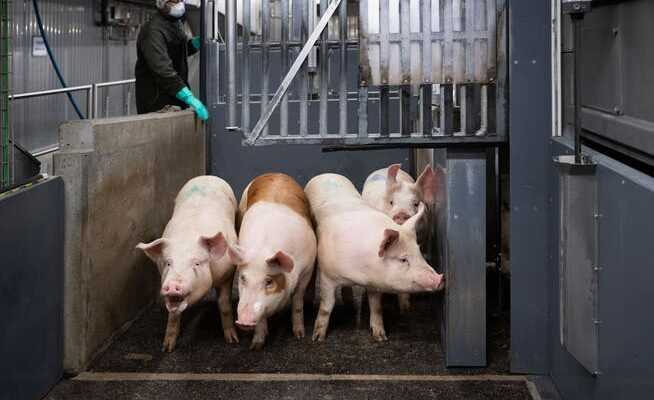The SVP calls for a cultivation battle like in the Second World War. She wants to plow flower strips in the farmland. But the problem lies elsewhere.
In an emergency, Switzerland needs to give up pork and chicken. No additional cultivated land.
At turning points there is a before and an after. And agriculture, this battered one, is in a better position afterwards than before. From this point of view, it was a matter of time before the SVP Farmers’ Party would address the issue. Now she has done it: The SVP is demanding a cultivation battle, an “election plan” like in the Second World War. The party wants to “massively” increase the degree of self-sufficiency in Switzerland. As the first, most important measure, she considers it that “ideologically blinded left-green” ecological projects are suspended.
So the tone is shrill, but the claim to content is thin. The cultivation battle of the SVP has the same problem as the historical model: real successes on the field are not to be expected. It’s about ideology.
The War as Opportunity
The SVP has been fighting against ecological projects in agriculture for thirty years. Former party president Toni Brunner once said that the federal government wanted to force farmers to become socialists by promoting biodiversity.
Now the SVP sees the war as an opportunity for a turnaround in agricultural policy. She specifically demands in Parliament that planned flower meadows in arable land be abandoned. Instead, food should grow there.
That would be, as an SVP national councilor put it in Blick, a few additional tons of grain and “a heap of bread”. And of course: In an emergency, everyone would rather eat bread than flowers. But the flower strips make up 3.5 percent of the arable land. Switzerland would produce the much larger “heap of bread” on the 43 percent of arable land on which fodder for cows and pigs grows today.
The real war menu is vegetarian
The agricultural research institute Agroscope agrees. In 2018, on behalf of the federal government, she examined whether and how Switzerland could feed itself in the event of “power-political or military threats”. The result was the good news that Switzerland could manage without imported food. However, only with a war menu that is greener than the green party.
Mainly bread, pasta and potatoes would end up on the plate in this case. Up to 90 percent of fattening pigs and poultry would have to disappear. So the realistic crop battle isn’t just plowing a few flower meadows. But in an almost vegetarian menu.
That is also clear to the SVP. She doesn’t say it because her cultivation campaign is aimed at profiling and self-interest. Your demands in Parliament are old, simply translated into wartime vocabulary. With the cultivation battle, not only the organic meadows are to disappear, but also new regulations for liquid manure. And of course the budget would be increased for the farmers. How about without it.
The problem lies with fertilizer and seeds
Important figures such as the farmers’ president Markus Ritter signed the motion in parliament. She has a real chance of acceptance, but she doesn’t say a word about what so many federal reports describe as a real threat to supply: that Switzerland imports 100 percent of the seeds in certain crops, for example. That most of the pesticides come from abroad. And 100 percent of artificial fertilizer. Most of them from Russia.
If Swiss agriculture has to adapt to the crisis, the problem will not be the flower strips in the field, but the many tools that are needed to cultivate the field. The federal government had to open the mandatory fertilizer stockpile before the outbreak of war because production had been curtailed due to high gas prices.
It is important that we can fill the camps again as much as possible. That we are looking for alternatives to importing. And also learn to use much less fertilizer and other auxiliary materials.
There are farmers who can already do that. They produce organic.
